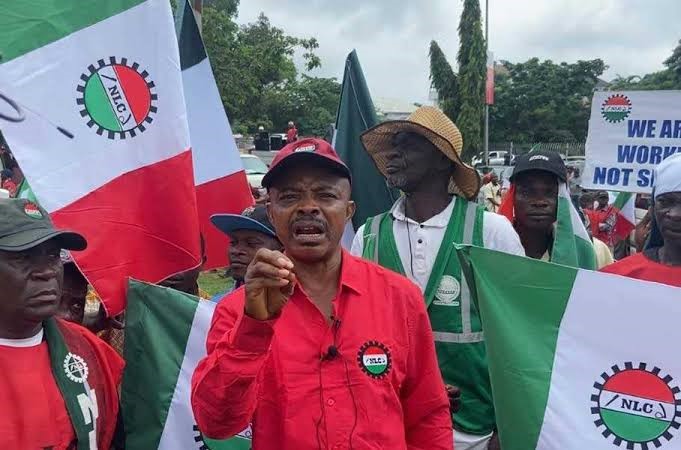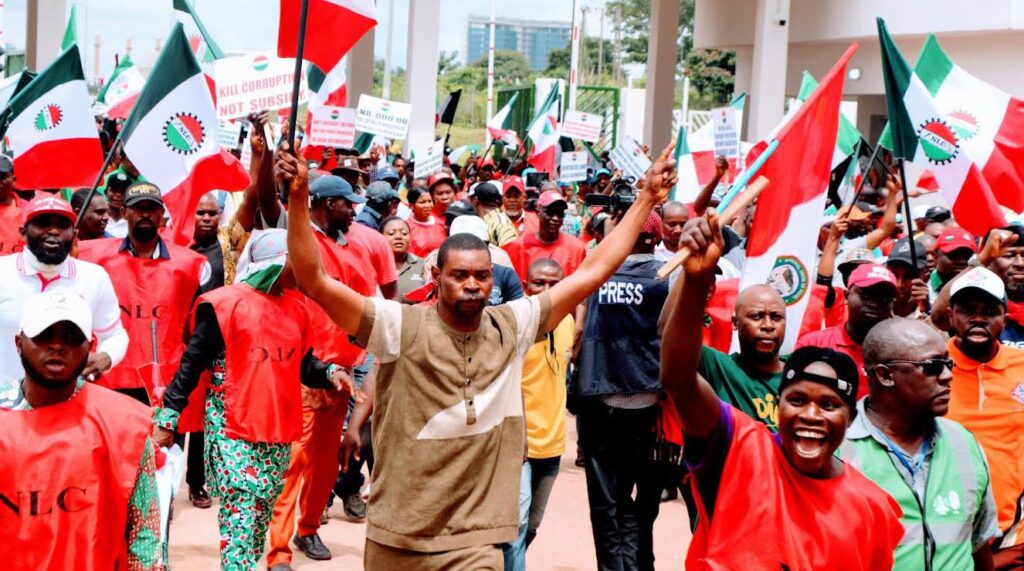Following a recent two-day nationwide warning strike, organized labour has issued a stern ultimatum to the Federal Government. If the government fails to meet its demands within the next week, they threaten to initiate an indefinite strike. This decision comes in response to the government’s failure to provide palliatives to alleviate the hardships caused by the removal of fuel subsidies.
In a dramatic turn of events, the Nigerian Labour Congress (NLC) has issued an ultimatum, threatening to launch an indefinite strike if the government does not address its concerns regarding the removal of fuel subsidies. This ultimatum comes in the wake of post-subsidy talks that have left the labour union deeply dissatisfied with the government’s stance.
The NLC’s National Assistant General Secretary, Mr Christopher Onyeka, criticized the government for allocating N100 million to each member of the National Assembly while offering a mere bag of rice to a dozen citizens. The NLC had previously issued a 21-day ultimatum to the government regarding the delay in distributing palliatives, warning of an indefinite labour action if their demands were not met.
The NLC’s determination is evident in their recent two-day warning strike, which partially disrupted social and economic activities in various states. This strike was a precursor to the complete shutdown that may follow if the government fails to address their demands.
Among their demands, the NLC and the Trade Union Congress are seeking wage awards, the implementation of palliatives, tax exemptions, allowances for public sector workers, and a review of the minimum wage. While the government had committed to restructuring the framework for engaging with organized labour on palliatives, this process remains stagnant, with the initial eight-week timeframe having expired without progress.

Christopher Onyeka emphasized that the government has abandoned negotiations and that there is no ongoing good-faith negotiation with Nigerians. The NLC has called for collective action to ensure the government addresses the needs and interests of the Nigerian people.
The catalyst for this move is the government’s inability to provide palliatives to alleviate the hardships experienced by Nigerians due to the removal of fuel subsidies. The Nigeria Labour Congress (NLC) has indicated that this indefinite strike, which may commence as early as next week, could severely disrupt commercial and economic activities across the nation.
The NLC has been demanding wage awards, the implementation of palliatives, tax exemptions, and allowances for public sector workers, as well as a review of the minimum wage. Despite the government’s commitment to restructuring the framework for engaging with organized labour on palliatives, the eight-week timeline set for this process has expired with no progress.
The labour union’s stance is articulated in their grievances, primarily concerning the economic burden that subsidy removal places on ordinary Nigerians. They argue that the removal of fuel subsidies will result in skyrocketing fuel prices, causing inflation and an overall decline in living standards.
The high cost of living has made it challenging for civil servants to make ends meet. Transportation costs have surged, and the prices of essential goods have risen significantly. Some workers have even resorted to part-time jobs to cope with the financial strain.
The Ekiti State NLC Chairman, Kolapo Olatunde, emphasized the need for a salary increment, given the rising cost of living, particularly the increased expenses associated with fuel. He argued that the government should focus on providing workers with the necessary support to perform their jobs effectively, rather than reducing working days, which may lead to unemployment.
In Kwara State, workers have started reporting to the office three times a week to save on transportation costs. The state government has temporarily increased salaries by N10,000 while reviewing the minimum wage.
The NLC insists that the government has abandoned negotiations and has not demonstrated good faith in addressing the workers’ concerns. As the ultimatum’s end date approaches, tensions rise, and the nation waits to see if a resolution can be reached before the indefinite strike takes effect. The plight of the Nigerian workforce remains a critical issue with far-reaching implications for the nation’s economy and its people.

The NLC’s decision to issue a one-week ultimatum for the government to respond to their demands reflects the escalating tensions surrounding the subsidy removal issue. This move has sent shockwaves through the country, as it threatens to disrupt essential services and cripple the economy.
This strike threat harks back to previous instances when labour unions in Nigeria have taken industrial action to protest government policies. The NLC’s decision to issue this ultimatum underscores the significance of the subsidy removal issue and its potential consequences.
As the one-week deadline looms, both the government and the labour union face a critical juncture. The outcome of these post-subsidy talks will undoubtedly have far-reaching implications for Nigeria’s economy and the livelihoods of its citizens. The nation watches with bated breath, hoping for a resolution that balances economic realities with the welfare of the people.
As the clock ticks down on this ultimatum, the nation watches closely, hoping for a peaceful resolution that considers the concerns of the labour unions while also considering the broader economic implications of subsidy removal. The outcome of these post-subsidy talks will undoubtedly have far-reaching consequences for Nigeria’s economic stability and the well-being of its citizens.
Sources
- https://punchng.com/post-subsidy-talks-labour-threatens-indefinite-strike-gives-one-week-ultimatum/?amp
- https://ogtv.com.ng/2023/09/13/post-subsidy-talks-labour-threatens-indefinite-strike-gives-one-week-ultimatum/
- https://thenigerialawyer.com/post-subsidy-negotiations-labor-issues-indefinite-strike-warning-sets-one-week-deadline/
- https://nairametrics.com/2023/09/13/subsidy-removal-again-labour-threatens-indefinite-strike-gives-one-week-deadline/
- https://igberetvnews.com/1452686/post-subsidy-talks-labour-threatens-indefinite-strike-gives-one-week-ultimatum/#forward




